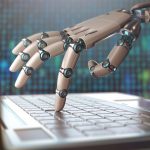Scientists at the University of Michigan have developed an artificial intelligence system that can conduct up to 10,000 autonomous scientific experiments daily.
A Microbiology Revolution
The system, called BacterAI, identified the amino acid requirements for the growth of two beneficial microbes in human mouths that promote oral health.
The study uncovered the potential for AI systems to perform autonomous experiments without any pre-existing data, which could vastly increase the throughput of microbiology via machine learning.
AI and Gut Health
“We know almost nothing about most of the bacteria that influence our health. Understanding how bacteria grow is the first step toward reengineering our microbiome,” says Paul Jensen, former U-M assistant professor of biomedical engineering, University of Illinois.
The human microbiome consists of trillions of bacteria that live on our skin and throughout our digestive system. They are understood to have a close relationship with our immune system and play a crucial role in maintaining overall health.
Systems like BacterAI could rapidly unlock secrets behind this intriguing ecosystem that we have a close relationship with.
The 20 amino acids needed to sustain tissue and cell functions offer over a million possible combinations, making the process of identifying these amino acid combinations a difficult task. However, BacterAI was able to discover the specific combinations necessary to support the microbes’ growth within just nine days.
Incredible Capacity To Learn And Adapt
Even more impressive was BacterAI’s ability to create its own data set by conducting a series of experiments and analyzing the results to generate predictions for future trials. This method proved successful, and the system figured out most of the rules for feeding bacteria after fewer than 4,000 experiments.
Unlike conventional methods that feed labelled data sets into machine-learning models, BacterAI can predict which experiments will provide the most informative results. By honing its focus and changing combinations each morning based on the previous day’s results, BacterAI produced accurate predictions 90% of the time.
Vast Potential Across All Industries
With the capability to conduct up to 10,000 experiments in a single day, researchers in any field could set up questions as puzzles for AI to solve in a similar trial-and-error fashion, which could dramatically increase the rate of scientific discoveries.
Adam Dama, the lead author of the study, is optimistic about the future of using AI for research; “With the recent explosion of mainstream AI over the last several months, many people are uncertain about what it will bring in the future, both positive and negative. But to me, it’s very clear that focused applications of AI like our project will accelerate everyday research.”
Conclusion
BacterAI’s capability to carry out large numbers of autonomous experiments could save incredible amounts of time and resources in research efforts. This could drive a drastic leap forward in the pace of discovery in areas from medicine to agriculture to environmental science.
AI systems like these will also drastically elevate our understanding of the human microbiome, associated diseases and potential health outcomes.
The research was funded by the National Institutes of Health and supported by NVIDIA and was published in Nature Microbiology.











